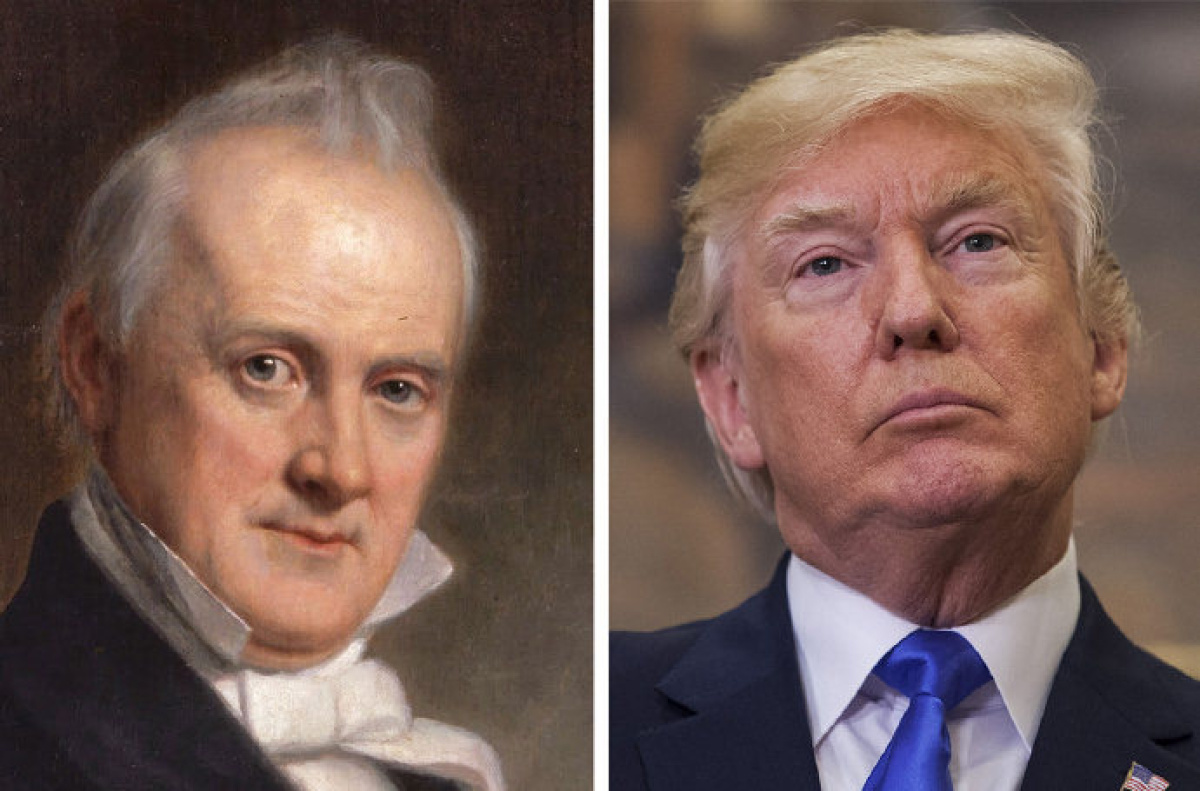
Having recently completed Jean H. Baker’s book “James Buchanan,” the presidents elected in 1856 and 2016 are alike in many ways, although there are still some significant differences. This column focuses on the similarities and how history may have reinvented itself 160 years later.
To start with, the country was more divided than we had witnessed previously, going into both elections. Buchanan carried five northern states while sweeping the South accumulating 45 percent of the vote. Trump would take six northern states, almost sweeping the South and capturing 46 percent of the vote. Both men were educated in Pennsylvania. Both were northerners and nominated to the presidency in Ohio cities.
Our 15th and 45th presidents came into office extremely wealthy. Both were old for their era when elected -Buchanan, 65, and Trump, 70. Each president highly respected Andrew Jackson. Popularity greatly mattered to both. Their views on states rights paralleled one another to a considerable degree.
And both presidents were very close to a U.S. Senator from Alabama – William King and Jeff Sessions.
Quarrels with Mexico and border protection dominated a great deal of their attention. Although Buchanan never married unlike Trump, his niece, Harriet Lane, became the de facto First Lady similar to Ivanka’s role at the outset of the current presidency. (Before the Civil War, only three of 100 men remained single according to author Baker.)
White males were primarily responsible for both of their elections. Buchanan’s and Trump’s running mates were from neighboring states. Investigations also dominated both presidencies (at least in year one of our current president) with Buchanan dismissing his investigation as an inquisition. Testimonies were believed to have been leaked from both congressional investigations. James Buchanan was considered to be one of the hawkish chief executives in U.S. history, sound familiar?
Buchanan stigmatized the Republicans (his opposing party as the party roles were reversed in 1856) as a party of treason. Author Baker speculated that Buchanan came closer to committing treason than any other president in history due to his pro-southern positions leading up to the Civil War.
Looking back at the midterm election of 1858, Buchanan’s Democrats lost 28 seats in the House, but none in the Senate – something to ponder looking ahead to November. History does have a way of repeating itself.
In closing, the deeper I dove into Ms. Baker’s fascinating book, the more interesting the comparisons became. My interest in Buchanan and his presidency stemmed from historians giving him such scathing reviews. I was curious to find out for myself if he had been judged fairly in the court of history.
In my opinion, he was not. Entering the presidency, his resumé was one of the more impressive of the 14 presidents who preceded him, if not the most. Our current president’s resumé is equally impressive, but in the private sector as opposed to Buchanan’s public life. Our 15th and 45th presidents: two great men for their eras.
*Editor’s Note: The views and opinions expressed in this article are those of the author and do not necessarily reflect those of other staff and/or contributors of HottyToddy.com. For questions, comments or to submit your own guest column, email hottytoddynews@gmail.com.
 Steve Vassallo is a HottyToddy.com contributor. Steve writes on Ole Miss athletics, Oxford businesses and people, politics and other subjects. He is an Ole Miss grad and former radio announcer for the basketball team. Currently, Steve is a highly successful leader in the real estate business who lives in Oxford with his wife Rosie. You can contact Steve at sovassallo@gmail.com or call him at 985-852-7745.
Steve Vassallo is a HottyToddy.com contributor. Steve writes on Ole Miss athletics, Oxford businesses and people, politics and other subjects. He is an Ole Miss grad and former radio announcer for the basketball team. Currently, Steve is a highly successful leader in the real estate business who lives in Oxford with his wife Rosie. You can contact Steve at sovassallo@gmail.com or call him at 985-852-7745.
